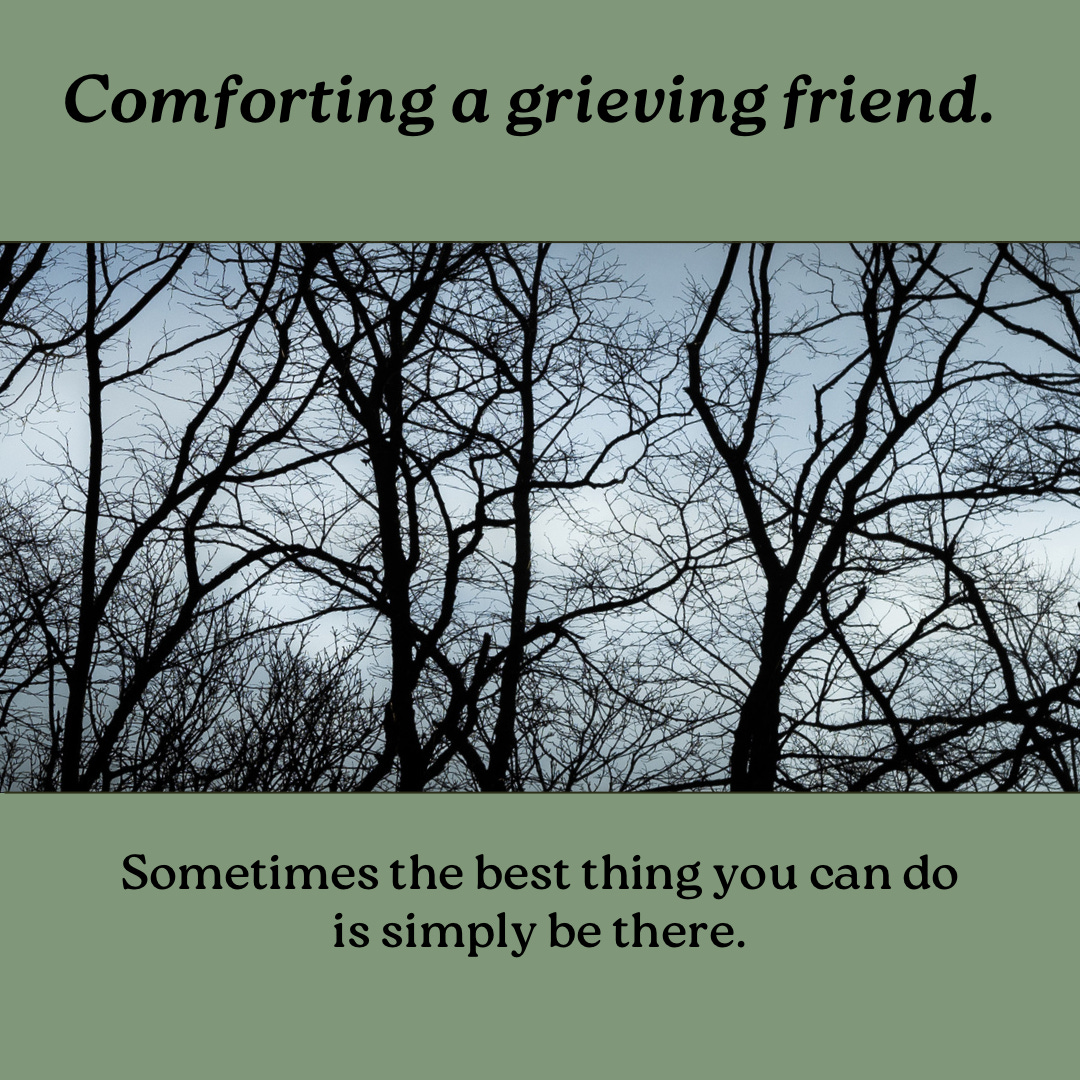[This is a repeat of a post from when I began Mortality Musings back in July. I share it again now because it speaks to how we can be with someone’s grief at a time of year when it feels even more difficult to do that. ]
Someone you love is hurting. They are deep in grief, and you want to reach out to them. Your brain says:
“Grief is scary. I don’t want to think about this right now.”
“I don’t want to make them feel worse, I might say the wrong thing”
“There must be some ‘right’ thing to say, why can’t I think of it?”
“I’m sure plenty of people are supporting them, I’ll just sit this out for now”
Grief can feel overwhelming, and because of that your brain… well, basically it lies.
So what is it with grief, and how do we Person-Up, jump in and face it for the people we love who are hurting?
Grief is an emotion, and also a state of being. We don’t just feel grief, we DO grief, and it does a number on us too. Sometimes it gets carried in us physically, in tense muscles, not being able to sleep, sleeping too much, crying, saying nothing, saying too much in order to keep the brain busy (yeah, the same brain who lies), etc. etc. I can’t describe grief because it’s so intensely personal. It’s both present and ephemeral. It stays and camps inside the heart and mind and body, and just when you think you’re surfacing it comes again, unbidden, on a song, or a smell, or a flash of a memory.
So if grief is that complex and indescribable and huge and sneaky, why would you think that anything you do or say is going to cause more harm? Grief simply IS, and the question becomes less “what can I say?” and more “how can I show up?”
It’s important to note that there are things that are said to a person in grief that can hurt more. These include Platitudes -
“They’re in a better place” (but I want them here);
“Heaven needed another angel” (why?)
And also “Silver Linings”
“well at least you still have your other kids.” (the one I lost was expendable?)
… I honestly can’t write any more examples of this, it just doesn’t fit my heart and mind.
What phrases like this are trying to do is FIX something, make something ALL BETTER, and usually so the sharer feels better, not the one who’s grieving. Grief can not be fixed. Grief need not be fixed, or avoided , or gotten over, or resolved. It simply Is. It’s natural, and normal, and totally OK to feel anything but OK.
So where does that leave you as far as what to say? First thing is to show up - be present with the grieving person and let them know that you care, and just be with them. This isn’t only face-to-face, but on the Phone, Text, FaceTime, Zoom, Skype whatever. The words are less important than your presence, and keeping in touch with what’s in your heart can make all of this less uncomfortable. A caring, open and honest heart, that’s where it all starts.
Say the name of the person who is gone. You can’t make someone who is grieving feel worse, they are already deep in the worst of it. But avoiding talking about the one they’ve lost can make that person seem even further away. So follow the griever’s lead and talk about them, remember the things that made them special, or funny, or even difficult to be with. If that’s the reality - this person was a pain in the ass - then that’s remembering who they truly were, and it’s way more honest than making it seem like none of that was ever true.
And there’s so much room to say nothing. Nothing at all. Be present with and for the griever and know that silence does not need to be filled. Things do not need to move forward and be resolved. Sit with them and their sadness and breathe. Breathing makes so many things feel better and less scary.
Then stay in touch. Drop a text or a voicemail with no expectation of getting a call back. It’s like dropping a little lifeline to say “I remember, and I’m still here for you.” After the first month or two the sympathy cards have stopped, and the flowers are all dead and gone (well, all except for the spectacular Peace Lily from my friend’s Mother In Law’s funeral that just keeps growing and blooming.) That’s when I like to send a note, with my love and a reminder that the world may go back to normal but I know it’s not normal for them, and I’m still here. You want to send someone your Thoughts and Prayers? This is when to do it.
So, does this make grief easy to deal with? Hell, no.
Do you get to feel less uncomfortable in the face of someone else’s grief? I hope so.






My mother-in-law passed away a few years ago. There must have been hundreds of people who came to offer their condolences to my wife and I. Yet, it was when I was hiding away from the masses in a stairwell of the church with my three best friends and their wives that I felt the freedom to grieve. They said nothing. They offered no words or no hugs. We just laughed about each other's lives. It was profound. I remember it vividly like I was watching a moment of my life like an outside observer as we all hid in the stairwell. They gave me the most comfort and peace amidst the grief I felt, for no other reason that they were present. They put on no masks of grief and love for my benefit. They were just themselves.